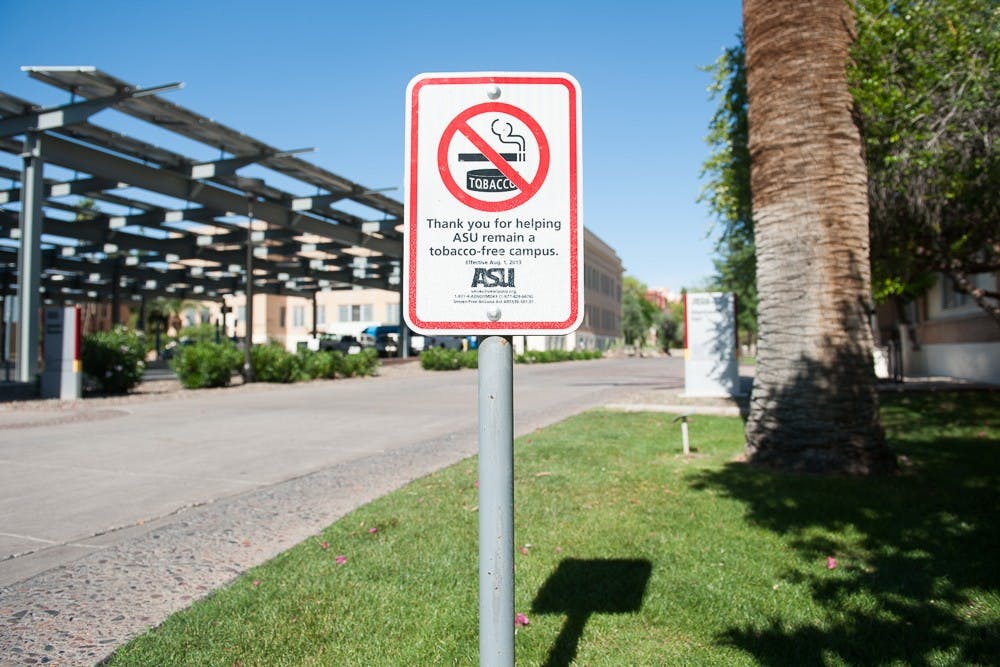“Let’s make ASU a breath of fresh air,” reads the banner on ASU’s Tobacco-free Initiative webpage. The enforcement of this ambitious policy in order to promote wellness on the university’s campuses is certainly easy to support. However, the reality of success is going to be far less tangible than their fancy website.
Beginning June 2015, students, visitors and employees must abide by the newly enforced, 2-year-old policy banning all tobacco products. Prior to this, the policy was community enforced. ASU identifies itself as 100 percent tobacco-free, as well as 100 percent smoke-free, but is that actually possible?
ASU is a tobacco free campus, yet I still managed to get smoke blown in my face once a day... K.
— stace (@stephlace4) April 16, 2015
The ASU Tobacco-free Initiative is nothing new — it was developed and put into effect on Aug. 1, 2013. So why hasn’t it been enforced until now? According to the FAQs, a committee has been working with faculty, student government and other tobacco-free universities to formulate an action plan in order to smoothly implement the policy.
Based on the statistic that 18.7 percent of adults aged 18-24 smoke in the U.S., we can approximate that close to 15,000 of ASU’s 82,000 students smoke. Enforcement of the tobacco-free policy will actively prohibit the use of all tobacco products, including smokeless options. Tobacco is now completely banned on “university property, facilities, grounds, parking structures, university-owned vehicles and structures owned or leased by the university,” according to the official policy.
This means that thousands of students will have to migrate from ASU property at intervals throughout the day in order to keep up their habit. What an inconvenience. By making it annoyingly difficult to take a smoke break between classes or during a work break, the university is essentially forcing people to make a decision: to smoke or not to smoke. The problem with this philosophy of inconvenience is that addiction demands to be a priority — that is what makes it an addiction.
Luckily, the initiative does a satisfactory job of providing resources to help students and employees quit smoking. The initiative has an impressive focus on these resources, which is a huge pro for this type of policy enforcement. The use of tobacco, in any form, is an addictive behavior that becomes harder for users to control. By prohibiting tobacco addicts from indulging in this behavior, ASU is essentially setting up students and employees for a tougher time warding off withdrawals.
None of this is bad. It fact, it is probably a good way to encourage the exhaustion of mid-degree college students to keep them on a couch, pouring over a textbook, rather than stepping outside for a cigarette break.
ASU being a tobacco free campus makes it hard to bum a cigarette when u need one
— logan saether (@looooogaaan) August 18, 2015
With numerous campuses and thousands of students, visitors and employees, ASU has a challenge lined up for them now that they are actively enforcing the tobacco-free policy. There is a lot of ground to cover and the compliance of thousands of individuals to moderate. Claiming that ASU is 100 percent smoke-free will be similar to saying that ASU is 100 percent alcohol-free. Technically, ASU is a dry campus, but as we all know, when someone wants to do something badly enough, they can suddenly become very creative.
Regardless of strict policies and the threat of fines and consequences, students still participate in the use of alcohol, even on campus and in student housing each year. It is an inevitable part of hundreds of people living in close quarters — not all of them will follow the rules.
Inconvenience will be the deciding factor of ASU’s Tobacco-free Initiative’s success as the university cracks down on enforcement and those who choose to try their luck at sneaky cigarettes behind trees or in corners. With this in mind, there is no way that ASU or any university can be 100 percent smoke-free or alcohol-free. There will always be a few who take the rules for granted and choose to risk getting caught, regardless of the consequences.
ASU will have to step up their seriousness and commit to the policy on all fronts if they hope to at least uphold the appearance of a truly 100 percent tobacco and smoke-free university.
Related Links:
ASU to crack down on tobacco-free policy
ASU Tobacco-free: A policy in desperate need of revision
Reach the columnist at smmaki@asu.edu or follow @symmaki on Twitter.
Like The State Press on Facebook and follow @statepress on Twitter.
Editor’s note: The opinions presented in this column are the author’s and do not imply any endorsement from The State Press or its editors.
Want to join the conversation? Send an email to opiniondesk.statepress@gmail.com. Keep letters under 300 words and be sure to include your university affiliation. Anonymity will not be granted.




